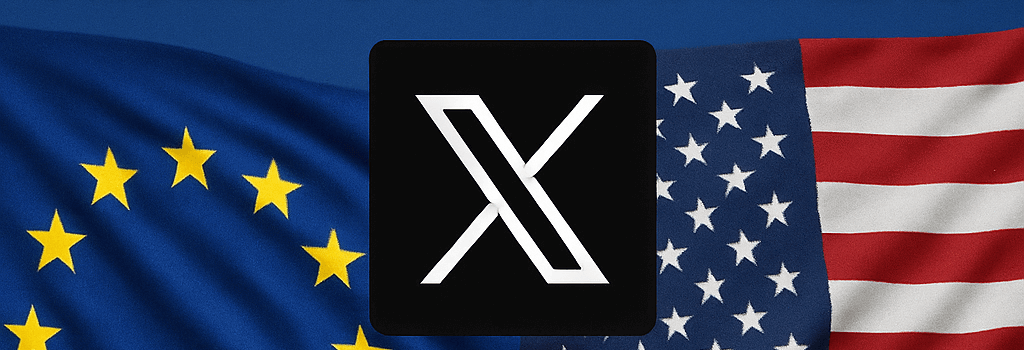EU Pauses DSA Probe of X Amid US Trade Talks

The European Commission has decided to stall its formal findings on Elon Musk’s social media platform X, citing interlinked negotiations over US–EU tariffs as the primary reason. Three officials familiar with the matter told us that Brussels will miss its self-imposed summer recess deadline to conclude the Digital Services Act (DSA) investigation into alleged transparency and design breaches.
1. Background on the Digital Services Act Investigation
Under the DSA, platforms with over 45 million active users in the EU must adhere to stringent transparency requirements, provide detailed moderation reporting, and ensure algorithms do not engage in ‘dark patterns.’ Last year, preliminary findings suggested X had fallen short on:
- Deceptive interface design: ’Nudge’ features that steer users toward promoted or sensational content without clear disclosures.
- Data access & transparency: Insufficient public data on content removal rates, ad placements, and recommendation logic.
Potential fines can reach up to 6 percent of global annual turnover—an amount that could scale into the hundreds of millions given X’s reported revenues. However, most penalties under the DSA historically land well below that ceiling after settlement discussions.
2. Technical Deep Dive: DSA Compliance Requirements
Achieving full compliance with the DSA demands significant investment in backend telemetry and governance pipelines:
- Real-time monitoring: Integrate log aggregation tools (e.g., Elasticsearch, Splunk) that capture user interactions, takedown notices, and ad metrics within milliseconds.
- Algorithmic auditing: Implement explainable AI frameworks—such as Google’s What-If Tool or open-source Alibi—to generate transparency reports on recommendation systems.
- Data retention policies: Use GDPR-compliant cloud storage (AWS S3 with encryption at rest, Azure Blob Storage) with fine-grained IAM roles to secure user data for audit trails.
Sources in Brussels note that X’s internal compliance team has been rapidly scaling up DevOps pipelines and automated reporting dashboards. Yet, aligning these engineering efforts with legal interpretations of the DSA can introduce up to a 6–9 month lag.
3. Geopolitical and Trade Implications
This pause comes amid renewed threats by US President Donald Trump to raise reciprocal tariffs on EU goods—from 10 percent to 30 percent starting August 1—if a trade accord isn’t reached. Brussels has been negotiating since April, aiming to avert an escalation that could impact €300 billion in bilateral trade.
“All these decisions are tied up,” one EU trade official remarked. “Nobody wants to provoke a tariff battle that hurts farmers, automakers, and indeed tech exports on both sides.”
Critics argue that delaying digital enforcement for trade leverage risks undermining the EU’s regulatory credibility. Yet the Commission insists its approach is pragmatic:
- Trade Commissioner Valdis Dombrovskis stresses that the DSA’s enforcement is “legally independent” of trade talks.
- Commission President Ursula von der Leyen reaffirmed in June that “we will not water down our digital rulebook,” even as €700 million in fines were levied recently under the Digital Markets Act (DMA).
4. Expert Opinions and Next Steps
Anna Cavazzini (European Greens) warned: “Regulatory changes must remain a red line in tariff negotiations. We cannot trade away digital rights.” Meanwhile, trade analysts at Bruegel predict that a limited postponement of the DSA ruling could buy three to six months of political cover in Washington.
Beyond X, the Commission has active probes into Meta and TikTok under content moderation rules, as well as a fast-tracking request from Poland to examine X’s new AI chatbot Grok after reported instances of antisemitic output. X disputes the findings, stating:
“We disagree with the Commission’s assessment of our DSA compliance and the interpretation of its scope.”
5. Broader Impact on US Tech and the Future of EU Regulation
If Brussels ultimately presses ahead post-summertime, the decision will shape how other US Big Tech firms perceive regulatory risk in Europe. Key considerations include:
- Increased engineering costs: Building robust AI auditing frameworks may add 5–10 percent to a platform’s annual R&D budget.
- Jurisdictional fragmentation: Companies may need separate EU-only feature flags or cloud instances to isolate DSA-mandated logging and retention protocols.
- Precedent for AI Act compliance: With the upcoming EU AI Act, platforms like X must also embed risk management systems, human-in-the-loop checks, and continuous model evaluation pipelines.
Conclusion
The delay in X’s DSA probe highlights the interplay between digital sovereignty and global trade politics. As Brussels aims to finalize a deal that spares industries on both sides from punitive tariffs, digital regulation finds itself at the nexus of economic strategy and legislative integrity. Whatever the outcome, the episode underscores the technical, legal, and geopolitical complexities of governing today’s AI-driven platforms.